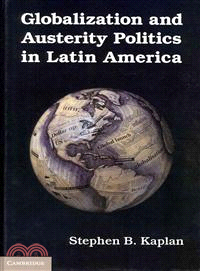 資料來源:
三民書局
資料來源:
三民書局
Globalization and austerity politics in Latin America
- 作者: Kaplan, Stephen B., 1973-
- 其他題名:
- Cambridge studies in comparative politics
- 出版: New York : Cambridge University Press
- 叢書名: Cambridge studies in comparative politics
- 主題: Globalization--Latin America. , Latin America--Economic policy. , Latin America--Politics and government
- ISBN: 9781107017979 (hbk.) 、 1107017971 (hbk.) 、 9781107670761 (pbk.): US$26.43 、 1107670764 (pbk.)
- 資料類型: 圖書
- 內容註: Includes bibliographical references (p. 293-314) and index. 1. Introduction -- 2. Globalization and austerity politics -- 3. The political economy of elections -- 4. The electoral boom-bust cycle -- 5. From gunboat to trading-floor diplomacy -- 6. When Latin American grasshoppers become ants -- 7. The political austerity cycle -- 8 Conclusion -- Appendix A. Field research interviews.
- 摘要註: "The book explores the effect of financial globalization on Latin American economic policy making"-- "Developing country politicians in a financially globalized world suffer a similar fate. Hoping to lift their countries to development's pinnacle, they toil against the fierce force of globalization. The repeatedly roll the policy boulder up the mountain. Hoping to please mercurial markets, governments cut spending, hike interest rates, and balance budgets. With each economic crisis, however, the rock repeatedly tumbles down the mountain. In this manner, financial volatility has wreaked havoc on developing country economies over the last two decades. Why are some countries able to surmount the gravity of globalization, while others suffer from a Sisyphus-like misfortune? Let us begin by taking a brief South American sojourn to Argentina and Venezuela. With the rise of the Latin American left over the last decade, scholars and the popular press have often placed these two countries under a similar radical or populist banner. They share other political and economic characteristics too. They are both presidential, upper middle-income countries that feature comparatively sized economies and populations. In terms of their macroeconomic approaches, however, their policy stances ...."--
-
讀者標籤:
- 系統號: 005110889 | 機讀編目格式
館藏資訊

In an age of financial globalization, are markets and democracy compatible? For developing countries, the dramatic internationalization of financial markets over the last two decades deepens tensions between politics and markets. Notwithstanding the rise of left-leaning governments in regions like Latin America, macroeconomic policies often have a neoliberal appearance. When is austerity imposed externally and when is it a domestic political choice? By combining statistical tests with extensive field research across Latin America, this book examines the effect of financial globalization on economic policymaking. Kaplan argues that a country's structural composition of international borrowing and its individual technocratic understanding of past economic crises combine to produce dramatically different outcomes in national policy choices. Incorporating these factors into an electoral politics framework, the book then challenges the conventional wisdom that political business cycles are